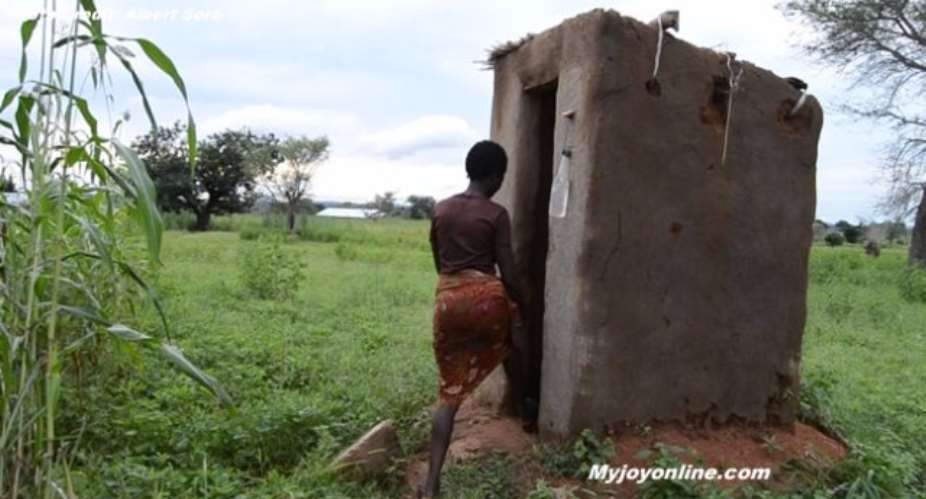Community members at Aberingabisi in the Bongo district of the Upper East Region are determined to help their community reach an open defecation – free status.
They are therefore taking their own initiatives to build latrines and encourage members of their households to use them.
Aberingabisi is a small farming community.
Here, a lot of small farms separate the houses which stand far apart from each other and the atmosphere smells of fresh grass as one enters the community.

However, Isaac Adongo, a community member told Joy News, the pleasant smell in the air was not so around this time last year.
“At first, people come here and immediately, they would start to use their hands to cover their nose”, he says, indicating that there was always a bad smell in the air.
Open defecation was a common practice at Aberingabisi.
With the homes far part from each other and no public toilet facility in this area, the community members used the bare lands as places of convenience.
Some of them even held the opinion that defecating in the open was contributing to soil fertility.
Less than a year ago, WaterAid Ghana in partnership with the Centre for Indigenous Knowledge and Organizational Development (CIKOD) engaged the Aberingabisi community to talk them into joining the Water, Sanitation and Hygiene for Public Health Project as one of the partner communities.
Adongo says, the arrival of the two organizations was eye-opening and soon, members of the community started to change their habits towards sanitation.
“Going to the toilet all around our houses was not good. So when they spoke to us, we saw that it was good to build the latrines”, he says.
Grace Atampugre, another community member and her family have put up a house-hold latrine. But one addition noticed is this tippy-tap made from a small plastic bottle which they cleverly hang on the wall of the latrine for the purpose of hand-washing anytime they used it.

Grace told Joy News, she has observed a decline in illnesses in the community ever since residents started putting up household latrines and using them.
The Water, Sanitation and Hygiene for Public Health Project dubbed; WASH4PH seeks to improve health outcomes of adults and children in Upper East Region, with a specific focus on the Bongo and Kassena Nankana West Districts.
It is being implemented by WaterAid Ghana and the Centre for Indigenous Knowledge and Organizational Development.
Adongo, Grace and other members of the Aberingabisi community are now using the latrines constructed by themselves, after participating in a latrine artisan training program organized in the community by WaterAid, which trained 20 persons from the Bongo District in February this year.

They say they are reaping the benefits.
The Aberinagabisi community has a vision of what development of their community looks like. There is no place for open defecation in their vision. They are determined to have a clean, healthy and prosperous community.
The paramount chief of the Bongo Traditional area, Naba Baba Salifu Lemyarum is one of the lead traditional advocates for proper sanitation and hygiene practices.
“I keep pleading with my people to ensure the practice of good sanitation and keeping our environment clean. It is only when we do this that we can be healthy”, Naba Lemyarum told Joy News.
Ghana has signed on to the Sustainable Development Goals and the United Nations Development Programme has set the year 2030 as target for countries to achieve Sustainable Development Goal 6 which concentrates on clean water and sanitation.

Under this goal, the UNDP says; “Achieving universal access to basic sanitation and ending the unsafe practice of open defecation will require substantial acceleration of progress in rural areas of Central and Southern Asia, Eastern and South-Eastern Asia and sub-Saharan Africa”.
The story of Aberingabisi makes one thing clear – ending open defecation in every committee and every district is possible.
The Upper East Region is one of the leading regions in Ghana with a high rate of open defecation practices. However, this can change as traditional and political leaders have now deeply involved themselves in the efforts to end open defecation.
But what more should Ghana do to ensure that we achieve sustainable development goal 6, which concentrates on clean water and sanitation?

Country Director of waterAid Ghana, Abdul-Nashiru Mohammed says “we must match our ambition with action”. He indicates that government must finance projects aimed at meeting sanitation goals, rather than rely on donors.

He adds; “the institutions that are set up to deliver and regulate services must be functional – the ministry with its two directorates; the water directorate and the environmental health and sanitation directorate, must all be functional”.





 Paramount Chief of Gwollu dead
Paramount Chief of Gwollu dead
 TUC tells informal sector employers to pay their employees the minimum wage
TUC tells informal sector employers to pay their employees the minimum wage
 Prof. Marfo urges good civilian-security relations to promote peace
Prof. Marfo urges good civilian-security relations to promote peace
 I was nearly jailed because of NPP; I’m still ‘pained’ — Hopeson Adorye
I was nearly jailed because of NPP; I’m still ‘pained’ — Hopeson Adorye
 Rising against NPP after being a minister for 15 years is a sin; God will judge ...
Rising against NPP after being a minister for 15 years is a sin; God will judge ...
 Cecilia Dapaah: Reasons behind AG’s advice to EOCO not grounded in law – Martin ...
Cecilia Dapaah: Reasons behind AG’s advice to EOCO not grounded in law – Martin ...
 NPP should have reported Kingsley Nyarko’s conduct to police – Inusah Fuseini
NPP should have reported Kingsley Nyarko’s conduct to police – Inusah Fuseini
 Akufo-Addo cuts sod for MIIF Technical Training Centre
Akufo-Addo cuts sod for MIIF Technical Training Centre
 NPP didn’t struggle to win Ejisu by-election – Samuel Ayeh-Paye
NPP didn’t struggle to win Ejisu by-election – Samuel Ayeh-Paye
 Naa Ayemoede returns to school
Naa Ayemoede returns to school
